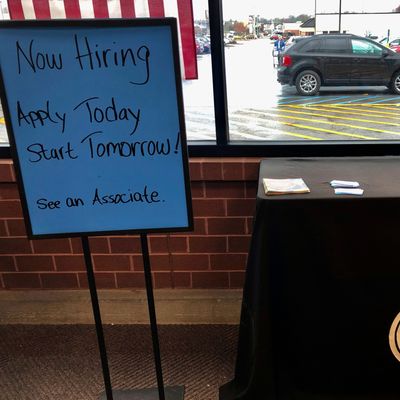
What Kroger giveth, Kroger taketh away. The national grocery-store chain will end a $2 per hour “hero pay” bonus for workers on May 17, the United Food and Commercial Workers union announced on Thursday. Kroger only implemented the raise last month; the pandemic, meanwhile, shows no sign of ending, and the risks for essential workers remain very real. In late April, UFCW announced that at least 30 of the grocery-store workers it represents have died of COVID-19. Four Kroger employees died from the virus in Michigan alone.
“Kroger is the biggest retail grocer in the US, possibly the world, and during this pandemic it has experienced record profits because families and communities rely on grocery workers to feed themselves and their families. Taking away this hero pay from these essential workers disregards their continued heroism as they serve their communities in crisis,” Kim Cordova, the president of UFCW Local 7, said in a press release. A spokesperson for the union confirmed to Intelligencer that Kroger’s policy change will take effect nationwide.
In a statement to Intelligencer, Kroger confirmed that the ‘hero bonus’ will end this month. “In the coming months, we know that our associates’ needs will continue to evolve and change as our country recovers,” said Kristal Howard, a Kroger spokesperson. “Our commitment is that we will continue to listen and be responsive, empowering us to make decisions that advance the needs of our associates, customers, communities and business. We continuously evaluate employee compensation and benefits packages. Our average hourly wage is $15 and with benefits factored in, like health care, the hourly wage is over $20.”
Kroger, which also owns Harris Teeter, Ralph’s, and Food 4 Less, employs around 460,000 workers, and it isn’t the only employer poised to wind down temporary hazard bonuses for workers. Amazon already ended its unlimited unpaid-time-off policy on May 1 over the protests of workers; other pandemic benefits, including double overtime pay and a $2 per hour raise, are scheduled to expire on May 16. The embattled company hasn’t announced whether it will renew those bonuses for another month.
And so the pandemic reinforces another old lesson: Corporate gratitude has its limits. Hero pay was a helpful marketing stunt for Kroger, at least for a while: The company could appear altruistic, and the bonus may have helped it retain workers in the earlier weeks of the pandemic, when stores were desperate to keep up with a sudden surge in demand. But circumstances have changed. Kroger likely knows that given high rates of unemployment, it can replace workers if they get sick, or die, or quit because they’re too afraid to go to work. Hero pay didn’t outlast the virus; it just outlived its usefulness to Kroger.
Kroger waited until April to limit the number of customers allowed in stores at a time, and workers in regional chains that Kroger owns have complained that the company was slow to offer adequate COVID-19 testing and protective gear. Essential workers have said for months that they don’t think of themselves as heroes, and aren’t asking to be treated as such; they want living wages, protective gear, and safe workplaces. They want fair compensation for their labor, and that’s further than Kroger is willing to go.
This post has been updated to include comment from Kroger.






























